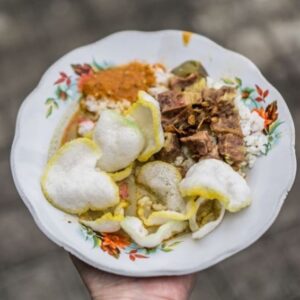loading…
Photo: Doc. Special
Glodok is not just a trade center, but a symbol of Chinese cultural encounters that have existed since the 17th century. In this Chinatown area which is full of history, you can experience the perfect combination of culture, history and culinary delights. Here, authentic Chinese culinary traditions remain alive and color people’s daily lives.
In the midst of the hustle and bustle of Jakarta’s Chinatown, there is a restaurant that has etched its name in culinary history. The name is: Nasi Campur Sedap Wangi which is located in Glodok, West Jakarta. Yes, if you are looking for a place that combines culinary delights with rich history, Glodok is the answer.
With secret recipes passed down from generation to generation and tantalizing flavors, Nasi Campur Sedap Wangi invites you to dive into the richness of Chinese culture through iconic and historical dishes.
“The life of the Chinese community, in this case Batavia, has diversity, uniqueness, distinctiveness that is different from other ethnicities in Indonesia and not to forget the richness of culinary types that are appetizing,” said Wildan Sena, a historian who graduated from Gajah Mada University in a release to SINDOnews.com , Wednesday (25/9/2024)
One of the culinary icons that you must try is Nasi Campur Sedap Wangi, which is often abbreviated as Nasi Campur SW. This restaurant has been operating since 1993 and is widely known for its secret family recipes passed down from generation to generation and this restaurant has become a culinary icon in Jakarta known for its unique mixed rice dishes that are rich in taste.
Founded by Kevin Fernando’s father, who migrated from Tanjung Balai Karimun, Nasi Campur SW is the realization of the dream of serving authentic culinary delights that are loved because in serving a secret recipe passed down from generation to generation, Nasi Campur SW is the epitome of authentic deliciousness. More than just a place to eat, Nasi Campur SW provides an experience that brings visitors nostalgia for classic Chinese culinary delights.
“What makes Nasi Campur Sedap Wangi so special? “One of them is the roast duck which is marinated with special spices for days, producing crispy, shiny skin and tender and juicy meat,” said Kevin Fernando, restaurant owner and heir to this family recipe.
Apart from duck, diners can also enjoy char siu, grilled chicken and samcan, which are served with soft Hainanese rice, creating an alluring mix of flavours. The success of Nasi Campur SW cannot be separated from the dedication to maintaining the authenticity of the taste, which has made this restaurant grow into four branches in Jakarta.
“We always try to maintain the quality and authenticity of taste, as passed down from the first generation,” explained Kevin.
The combination of soft Hainanese rice and selected meat dishes makes every bite an unforgettable exploration of flavors.
It is not surprising that this restaurant has opened four outlets in several strategic locations in Jakarta, with a commitment to continue serving authentic dishes that remain loyal to its traditional roots. “We always try to maintain the quality and authenticity of taste, as passed down from the first generation,” said Kevin Fernando.
As a result, with its rich history, culture and culinary offerings, Jakarta’s Chinatown continues to be an attractive tourist destination, while deepening understanding of Chinese heritage in Indonesia.
(un)






